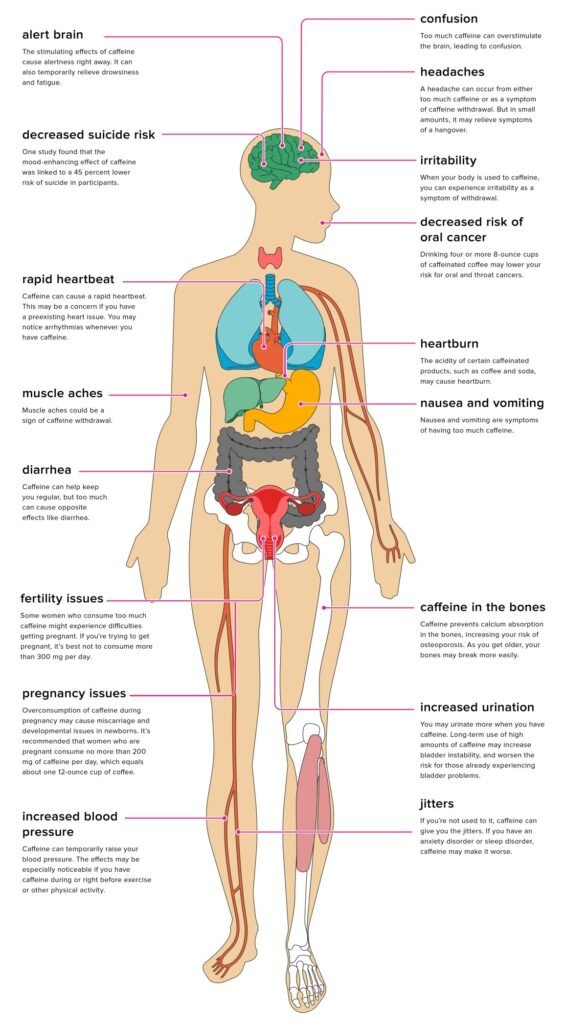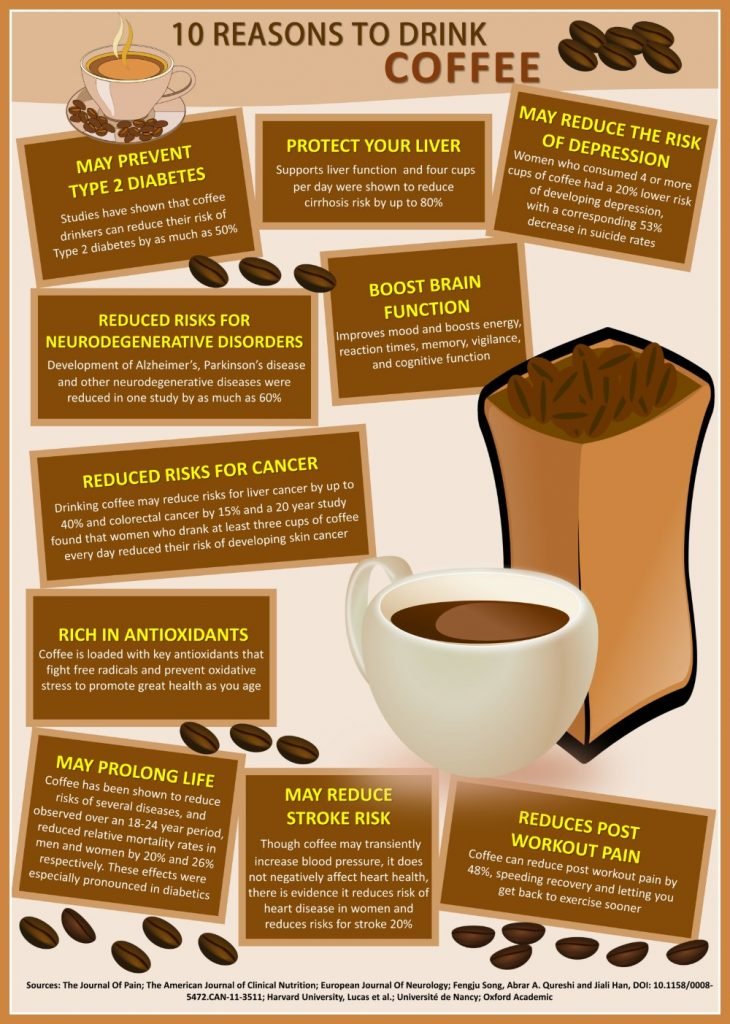Have you ever wondered what happens if you drink coffee every day? That steaming cup of coffee in the morning can feel like a lifesaver, but have you ever stopped to consider its long-term effects on your body?
A Brief Overview of Coffee Consumption
Coffee is one of the most popular beverages worldwide. Billions of cups are consumed every day, from a simple black coffee to elaborate lattes and espressos. The primary active ingredient in coffee is caffeine, a stimulant that affects your central nervous system. But how exactly does this beloved drink impact your body and mind?
The Origins of Coffee
Coffee has been consumed for centuries. Originally discovered in Ethiopia, it quickly spread to the Arabian Peninsula and later to Europe and the Americas. Today, coffee beans are grown in over 70 countries, predominantly in equatorial regions of the Americas, Southeast Asia, and Africa.
Positive Effects of Drinking Coffee Every Day
There are several benefits to drinking coffee daily, many backed by scientific research. Let’s explore some of them:
Boosts Physical Performance
Caffeine is known to improve physical performance by stimulating your nervous system and increasing the levels of adrenaline in your blood. Adrenaline prepares your body for intense physical exertion, making coffee a popular pre-workout beverage.
Enhances Mental Alertness
One of the most sought-after benefits of coffee is its ability to enhance mental alertness. Caffeine blocks the inhibitory neurotransmitter adenosine, increasing the firing of neurons and the release of other neurotransmitters like dopamine and norepinephrine. This results in improved mood, reaction time, and cognitive function.
Rich in Antioxidants
Coffee is rich in antioxidants such as polyphenols, which combat oxidative stress in your body. These antioxidants can help reduce inflammation and may lower the risk of several chronic diseases, including heart disease and cancer.
May Help in Weight Management
Some studies suggest that caffeine can increase your metabolic rate, helping you burn fat more effectively. While this isn’t a magic solution for weight loss, it can complement a balanced diet and regular exercise.
Potential Protection Against Neurodegenerative Diseases
There is evidence to suggest that regular coffee consumption may protect against neurodegenerative diseases like Alzheimer’s and Parkinson’s. While more research is needed, the current findings are promising.

Negative Effects of Drinking Coffee Every Day
While coffee has numerous benefits, it’s not without potential downsides. Like any substance, moderation is key.
Dependency and Tolerance
One of the most significant issues with daily coffee consumption is the potential for dependency and tolerance. Over time, your body may require more caffeine to achieve the same stimulating effects, leading to increased consumption and potential withdrawal symptoms like headaches, fatigue, and irritability.
| Symptoms of caffeine withdrawal | Solutions for managing withdrawal |
|---|---|
| Headaches | Gradually reduce intake |
| Fatigue | Ensure adequate sleep |
| Irritability | Exercise regularly |
| Difficulty concentrating | Stay hydrated and eat well |
Impact on Sleep
Regular caffeine intake, especially in the afternoon or evening, can negatively impact your sleep quality. Poor sleep can lead to a host of other health issues, including impaired cognitive function and increased stress levels.
Digestive Issues
For some people, coffee can cause digestive issues such as acid reflux, stomach upset, or even more serious conditions like gastritis. The acidity of coffee can irritate your stomach lining, particularly if consumed on an empty stomach.
Potential Bone Health Concerns
Excessive coffee consumption has been linked to reduced bone mineral density, potentially increasing the risk of fractures and osteoporosis. This is due to coffee’s potential to interfere with calcium absorption.
Increased Heart Rate and Blood Pressure
Caffeine can temporarily raise your heart rate and blood pressure. For people with certain medical conditions, this could pose a risk. Always consult with a healthcare provider if you have concerns about how caffeine affects your cardiovascular health.
How Much Coffee is Too Much?
Moderation is crucial when it comes to coffee consumption. According to the Dietary Guidelines for Americans, most adults can safely consume up to 400 milligrams of caffeine per day, roughly equivalent to four 8-ounce cups of coffee. Exceeding this amount may increase the risk of negative side effects.
| Caffeine Content in Common Coffee Drinks | Average Caffeine Content (mg) |
|---|---|
| Drip coffee (8 oz) | 95-200 |
| Espresso (1 oz) | 47-75 |
| Latte (8 oz) | 63-126 |
| Decaffeinated coffee (8 oz) | 2-5 |
Personalized Coffee Consumption
It’s essential to remember that sensitivity to caffeine varies from person to person. Some people metabolize caffeine quickly and can handle higher amounts without any issues, while others are more sensitive and may experience negative effects even with moderate consumption.

Special Considerations
Certain groups should be particularly mindful of their coffee consumption.
Pregnant Women
High caffeine intake during pregnancy has been linked to various complications, including preterm birth and low birth weight. It’s generally recommended that pregnant women limit their caffeine intake to less than 200 milligrams per day.
Individuals with Anxiety
Caffeine can exacerbate symptoms of anxiety, leading to increased heart rate, jitteriness, and panic attacks. If you suffer from anxiety, it may be wise to limit your coffee consumption or switch to decaffeinated varieties.
Those with Gastrointestinal Issues
Individuals with conditions like IBS (Irritable Bowel Syndrome) or acid reflux should monitor their coffee intake closely. The acidity and caffeine content can aggravate symptoms, making it crucial to find a balance or alternative beverages.
Tips for Healthier Coffee Consumption
If you love coffee but want to make healthier choices, here are some tips:
Choose Quality Beans
Opt for high-quality, organic coffee beans to reduce exposure to pesticides and other chemicals. Freshly ground beans offer better flavor and more antioxidants.
Mind Your Additives
Be cautious with adding sugar, flavored syrups, and cream. These can add unnecessary calories and sugar to your diet, negating some of the health benefits of coffee. Consider using natural sweeteners like honey or stevia and opting for plant-based milks.
Stay Hydrated
Coffee is a diuretic, meaning it can increase urine output and potentially lead to dehydration if consumed in excess. Ensure you’re drinking enough water throughout the day to stay hydrated.
Balance with a Nutritious Diet
Pair your coffee habits with a balanced diet rich in fruits, vegetables, whole grains, and lean proteins. This approach can help you manage the negative effects of caffeine and support overall health.

The Future of Coffee Research
As the popularity of coffee continues to rise, so does the interest in its various effects on health. Researchers are continually exploring new dimensions of how coffee impacts our bodies and minds, from its role in insulin resistance to its potential cancer-preventing properties.
The Role of Genetics
Emerging research is beginning to focus on how genetic factors influence our response to caffeine. Understanding these genetic markers can help customize coffee consumption guidelines for individuals based on their genetic predisposition.
Innovations in Brewing
Innovations in coffee brewing methods are also on the rise. From cold brew to nitro coffee, these new options offer different flavors and levels of caffeine, providing more choices for consumers.
Final Thoughts
Drinking coffee every day can offer numerous benefits, from enhanced mental alertness to potential protection against certain diseases. However, it’s crucial to consume it in moderation and be mindful of its possible negative effects. Personalizing your coffee habits to suit your lifestyle and health needs can help you enjoy this beloved beverage while minimizing any adverse impacts. So, next time you sip on your morning cup of joe, you’ll be well-informed about what it does for your body and mind.

